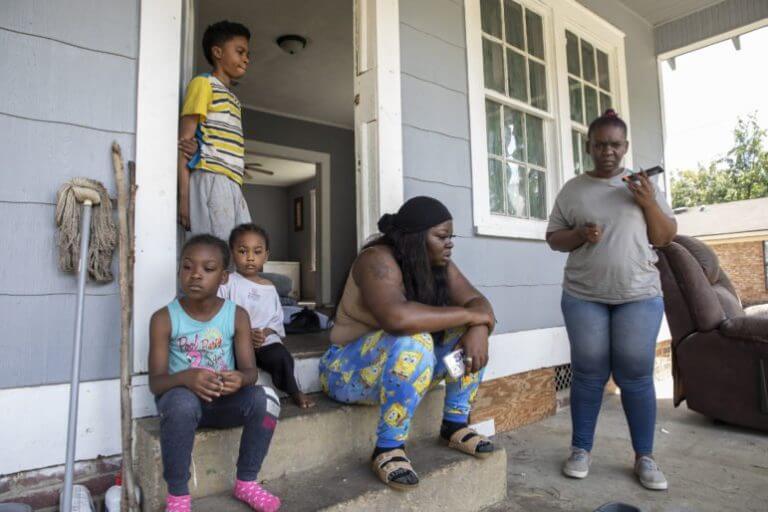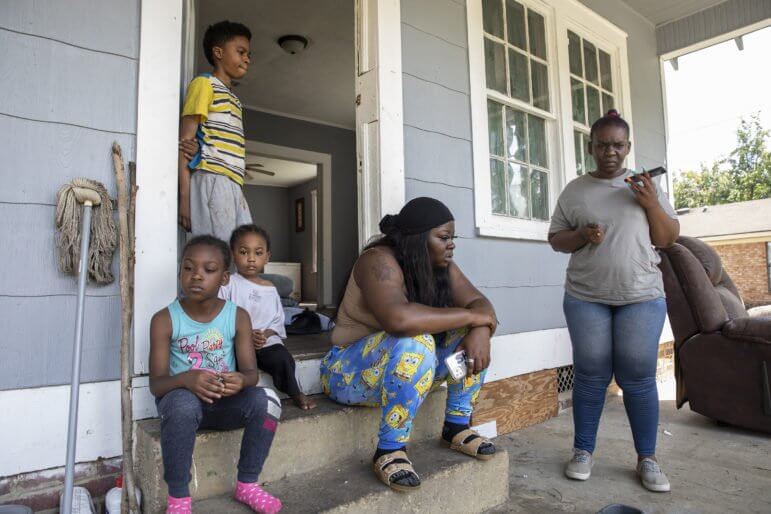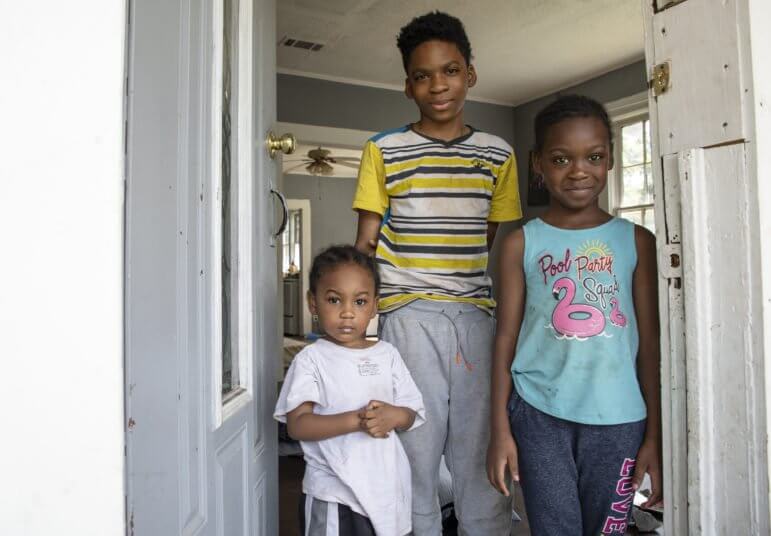

Eric J. Shelton/Mississippi Today
Keri Marshall (far right) talks to the landlord of the home from where her mother, who passed recently, was evicted, while her niece Lillian Cayson and her three children Kamarye Marshall, Ryan Mallard and Tykavian Marshall listen from the front stoop.
Where there’s uncertainty in the pandemic, poverty is a constant
The pandemic has both offered a short reprieve and exacerbated existing turmoil for Mississippi families living in deep poverty, whose complicated circumstances are not addressed by narrow relief.
By Anna Wolfe | August 6, 2020
“I don’t understand how you’re going to continue to pay the rent,” said Keri Marshall’s landlord, his voice coming through the speakerphone on her Android.
An hour earlier on July 28, Marshall, wearing blue skinny jeans, a grey T-shirt and her dark brown hair slicked back in a ponytail, was standing in a Lee County Justice Court room.
A judge told the 34-year-old single mother of four she had three days to pack up her belongings and move out of the three-bedroom Verona home where she and her children lived with her mother Dorothy Meadows.
The property company had evicted Meadows over a light bill, which was in the company’s name and went unpaid for months, racking up nearly $2,000 in debt. The landlord said the tenant should have switched the utility over to her name. Plus, no one but Meadows was supposed to be living there, per the lease. But by the time the 74-year-old Meadows was set to attend court at the end of June, she was too ill to appear.
She died of a heart attack on June 29, leaving Marshall and her children powerless in the eviction and reliant on the goodwill of a businessman.
The big brown recliner chair where Meadows had spent much of her time recently sits under the awning out front of the house now, collecting dirt.
“Everything I know, I learned from her,” said Marshall, who relied heavily on her mother for emotional, childrearing and financial support. “The only thing she never got a chance to teach me was how to be on my own, how to make it on my own.”

Eric J. Shelton/Mississippi Today
Siblings Ryan Mallard, Tykavian Marshall and Kamarye Marshall stand in the doorway of a rental home in Verona, Mississippi. Their mother, Keri Marshall, is trying to navigate an eviction from the home in late July.
The economic fallout of COVID-19 has thrown many families into uncertainty, especially as relief dwindles in the 20th week of the pandemic and with Congress yet to pass a new stimulus package.
But these conditions are all too familiar for families like the Marshalls, who were already living on the edge of homelessness in the most impoverished state in the nation before shutdowns began in March. In Marshall’s northeast Mississippi town, nearly a third of people live in poverty, compared to about one-fifth statewide.
Landlords typically require proof of income from tenants, which helps ensure landowners, who may have mortgages to pay, will not sustain missed payments. But that requirement also presents an issue for renters with nontraditional employment or who struggle to maintain a job. This is particularly true for single parents and during a shaky economy and can create a cycle of evictions, damaging the tenant’s credit and further entrenching them in poverty.
For some of these families, the pandemic has offered a short reprieve through eviction moratoriums, stimulus checks and increased unemployment benefits. And yet, the pandemic’s devastating impacts on health, social life and the larger economy has exacerbated their turmoil in other ways.
Lacking a high school diploma, Marshall said she’s having trouble finding not only stable employment, but a safe, open childcare center that is accepting new kids. That’s only when her day is not dominated by trying to keep a roof over her family.
Three of Marshall’s young children listened from the cement steps outside their apartment, a pale-blue bungalow, as their mother tried to convince landlord Johnoson Crutchfield of her position. “Mr. John, I’m not struggling. I’m really not,” she said.
Marshall, who last worked a part-time job at Burger King for a short stint, began drawing Pandemic Unemployment Assistance benefits in the last three weeks after telling the state unemployment office she was jobless due to the pandemic.
With the $600 weekly boost in benefits, Marshall has pulled more income, about $3,000 in July, than ever before. She had the money to pay August rent, she explained to Crutchfield. She could afford to stay another 30 days, at least.
“In the process, I’m trying to figure out where I can place my kids so I could go to work,” she told him. “If I go to work, I don’t have anybody to watch them. I can’t leave them by theyselves.”
He agreed to let her stay, even though Marshall’s name is not on the existing lease. To be sure, he didn’t have to do that. But Marshall’s unemployment benefits, which shrunk to under $100 a week at the end of July, will run out eventually — hence Crutchfield’s hesitancy.
“Basically, I’m still sinking. It’s not even keeping me above water,” Marshall said of the drop in benefits. “I just went straight under.”
Marshall said she spent her recent influx of cash through unemployment on past due bills — not just for utilities and cable, but also payments on the rent-to-own television and stove on which her mother had fallen behind — and back-to-school clothing for her growing children. What’s left isn’t more than about $5, she said. And she doesn’t have much family help: Two of her children’s fathers are incarcerated, and the other stopped checking in.
“I’m just living day by day,” Marshall said. “My mom always told me to never plan ahead because if you plan ahead, everything will not turn out the way it’s supposed to be. I literally learned that; I thought she was playing when she said that.”
Marshall wanted to work in the nursing field ever since she was a little girl, and she said she got close to securing her Certified Nursing Assistant credentials through Job Corps in 2004. But the program kicked her out when officers caught her friend shoplifting while they were together at Walmart.
On top of raising four children, she’s held a couple of short-term jobs — from food service gigs to factory positions through a temp agency to hairdressing for cash — every other year or so since then. At times, without her own vehicle, she’d often catch a ride with coworkers, and if they left the job, she’d have to quit too.
Marshall catches on quickly when someone demonstrates a skill or task, but she struggles with reading comprehension — the main barrier to completing her GED.
While the number of jobless Mississippians spiked from about 70,000 at the beginning of 2020 to nearly 104,000 by June, three months into the pandemic, a lesser regarded statistic shows another 86,000 have simply fallen out of the labor force altogether in that time, according to U.S. Bureau of Labor Statistics. Driven in part by the state’s unequal education system, low education attainment and lagging economic development, Mississippi has historically had one of the lowest labor force participation rates.
In June, Mississippi had the smallest workforce in the nation with just 52% of non-institutionalized working-age people in the state either working or looking for a job. The national average was 62%.
A statewide, multi-million dollar, federally funded program called Families First for Mississippi was purportedly designed to help people just like Marshall, who are often disconnected from the workforce, gain useful life skills like parenting, financial literacy and workplace etiquette. But earlier this year, the state auditor revealed that its creators had allegedly perpetuated the largest public embezzlement scheme in state history and the program ceased completely.
Now the state agency hasn’t retooled the welfare program to offer more cash assistance to families struggling to meet basic needs, the way at least one neighboring state has, during the pandemic.
Instead, Gov. Tate Reeves announced on Wednesday the creation of a new workforce development program to help people who have been laid off or otherwise economically damaged and are receiving unemployment benefits. The state is not conducting the job training itself, but is offering to reimburse companies who agree to hire and train new employees by 75% of the person’s wages during the training period, as long as they pay at least $15-an-hour.
Human Services also offers employment services called Skills2Work to low-income people who receive Supplemental Nutrition Assistance Program benefits, which essentially offers grants to existing work training programs in the community. But a representative at the DHS office in Lee County, where Marshall lives, said their work program has been on hold since the start of the pandemic.
Marshall is considering getting back a night shift at the lawnmower manufacturing facility in town. That way, she can stay with her kids during the day while they conduct their schooling from home, like thousands of other Mississippi children will do this school year due to the virus. Marshall said they’ll use her old cellphones to complete their work. She’d have to find someone who can babysit during the night. Sleep is barely part of the plan.
While the nation is bracing for an avalanche of evictions in coming months if Congress does not appropriate more rental assistance funds, landlords and rental managers told Mississippi Today they have been trying to work with people who have faced hardships due to COVID-19. Crutchfield, Marshall’s landlord and owner of Grab The Map properties, waived late fees in April for his tenants.
Those who have faced evictions since the state moratorium lifted on June 1, Crutchfield told Mississippi Today, “by and large are people who were not paying prior to coronavirus.”
“The people who were struggling before the virus are the people who are struggling now,” he said.
Officials from the Mississippi Center for Justice, Mississippi Center for Legal Services and the University of Mississippi’s Housing Clinic confirmed to Mississippi Today that they haven’t seen the wave of COVID-related evictions this summer that they might have anticipated, but they believe it’s coming.
These urgent circumstances could be temporarily relieved through policies — such as extended unemployment benefit enhancements, more rental assistance funding and eviction moratoriums — that Congress is hashing out in the coming stimulus package.
But the narrow relief proposals do not address longstanding barriers to economic mobility for thousands of Mississippians living in poverty, like Marshall, who face limited job prospects and an increasingly unaffordable housing market.
One local housing expert says the policy that would get closest to alleviating these conditions in Mississippi is universal basic income, similar to the $1,200 stimulus check working people received in the spring — only monthly for every adult. Jackson is the home to one such basic income pilot program.
“Nobody wants to be behind on their rent. Nobody wants to be chased by the utility companies and have their water shut off, and their lights shut off and their gas shut off. That is not desirable for anybody,” Scott Spivey, executive director of the Mississippi Home Corporation, told Mississippi Today. “Giving people the resources to where they don’t have to live in that situation would be a huge windfall.”
The post Where there’s uncertainty in the pandemic, poverty is a constant appeared first on Mississippi Today.
- Patients face canceled surgeries and delayed care amid UMMC cyberattack - February 20, 2026
- Goal is ‘better alignment, not bigger government’ for Mississippi tourism - February 20, 2026
- Challenging work hours, transportation, and child care continue to be workforce barriers in the Delta - February 20, 2026